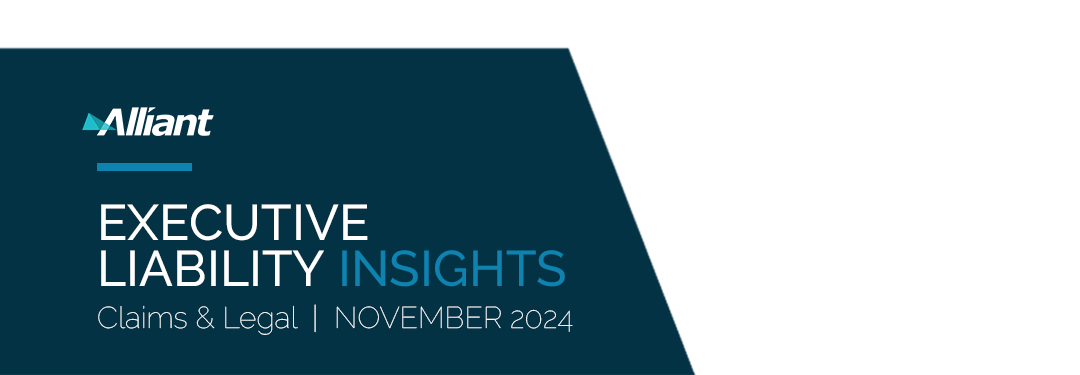
SECURITIES CORNER
INVESTMENT ADVISOR FOR “ESG” FUNDS ORDERED TO PAY $4 MILLION FOR COAL, NATURAL GAS, AND TOBACCO INVESTMENTS
In the Matter of WisdomTree Asset Management, Inc., Administrative Proceeding File No. 3-22268.


On October 21, 2024, the SEC issued an order requiring an investment advisor for three funds marketed as incorporating environmental, social, and governance (“ESG”) factors to pay a $4 million civil penalty. The order also censured the investment advisor and required it to cease and desist from committing further violations. While the investment advisor consented to the entry of the order, it did so without admitting or denying the findings contained in the order.
Prior to this matter, the investment advisor began a process to consider ESG investing by providing documents to the boards of three ESG funds that contained representations about the proposed investment process for the funds. As part of that investment process, the investment advisor represented to the boards that “[s]ecurities of companies involved in certain controversial products or activities,” such as fossil fuels and tobacco, would be “excluded” and “screened out.” The investment advisor contracted with research firms to provide data sets to assist with the efforts of excluding securities of companies involved in fossil fuels from the ESG funds’ portfolios. However, there were limitations to the data provided by the vendors in identifying all companies involved in fossil fuels-related businesses. These limitations were not disclosed to the ESG boards.
As a result of the limitations of the data received from the vendors, the investment advisor caused the ESG funds to “regularly” hold securities of companies involved in fossil fuel related activities. Such companies engaged in the transport of coal or the extraction, distribution, or sale of natural gas. Similar limitations led to the investment advisor investing in companies involved in retail tobacco sales.
Following an investigation by the SEC, the investment advisor updated the prospectuses for the ESG funds to include disclosures that revised the definition of “fossil fuels-related activities.” The prospectuses also no longer advised that the investment advisor screened out all companies involved with fossil fuels or tobacco regardless of revenue measures. The prospectuses were further updated to incorporate additional risk factors relating to limitations on information received from vendors.
As a result of these failures, the SEC found that the investment advisor “willfully” violated Sections 206(2) and 206(4) of the Advisers Act and Rules 206(4)-7 and 206(4)-8 promulgated thereunder, and Section 34(b) of the Investment Company Act. According to the SEC, “willfully . . . means no more than that the person charged with the duty knows what he is doing,” but there was no requirement that the actor “also be aware that he is violating one of the Rules or Acts.”
While most Directors & Officers and Errors & Omissions policies exclude coverage for fines and penalties, some of these policies provide coverage for the defense of investigations against entities and subpoenas as well. These policies also typically contain conduct exclusions that bar coverage for willful misconduct and/or violations of law, which must be reviewed carefully to determine their applicability.


The SEC released its examination priorities for Fiscal Year 2025 highlighting amendments to Form PF and Regulation S-P Rules, Cybersecurity, and Crypto Assets.
The SEC plans to focus on investor protections through new SEC rules affecting Form PF and Regulation S-P, under the Investment Advisers Act of 1940. Advisers to private funds remain a significant portion of the SEC-registered investment adviser (“RAIs”) population. The SEC will look to ensure disclosures are consistent with actual practices and compliance with the amendments to Form PF, including (i) quarterly event reports for adviser-led secondary transactions, the removal of a fund’s general partner, and an investor election to terminate a fund or an investment period; (ii) for large hedge fund advisers, reports detailing certain adverse events within 72 hours; and (iii) for large private equity fund advisers, a new section of Form PF detailing certain adverse events.
Due to their importance to retail investors, particularly those saving for retirement, the SEC will also focus on registered investment companies (RICs or funds), including mutual funds and exchange-traded funds. Examinations will review their compliance programs, disclosures, and governance practices. Particularly, the review will focus on: (i) fund fees and expenses; (ii) oversight of service providers; (iii) the consistency of portfolio management practices and disclosures; and (iv) issues associated with market volatility.
Regarding cybersecurity and Regulation S-P, the SEC plans to pay particular attention to firms’ policies and procedures, governance practices, data loss prevention, access controls, account management, and responses to cyber-related incidents, including ransomware attacks. The SEC will engage with firms during examinations about their progress in preparing to establish incident response programs designed to detect, respond to, and recover from unauthorized access to or use of customer information. The release highlighted emerging financial technologies such as automated investment tools, AI, trading algorithms or platforms, and the SEC’s plan to scrutinize the use of such technologies.
Finally, given the potential volatility and activity involving the crypto asset markets, the SEC will monitor and examine registrants offering crypto asset-related services. The examinations will focus on the offer, sale, recommendation, advice, trading, and other activities involving crypto assets that are offered and sold as securities or related products, such as spot bitcoin or ether exchange-traded products.
TECH GIANT PAYS MASSIVE SETTLEMENT TO RESOLVE ANTITRUST LAWSUIT
In re Alibaba Grp. Holding Ltd. Sec. Litig., No. 1:20-cv-09568 (S.D.N.Y., Oct. 25, 2024).


A multination technology company (the “Company”) specializing in e-commerce, retail, internet, and technology agreed to pay $433.5 million to settle a U.S. securities fraud class-action lawsuit. In the underlying class action investors sued the Company alleging violations of anti-monopoly or unfair competition laws. Despite requiring all merchants to choose only one distribution, the Company denied any wrongdoing and stated it entered the settlement to avoid the cost and disruption of further litigation.
The proposed settlement was filed in federal court in Manhattan and requires the approval of U.S. District Judge George Daniels. The settlement covers investors in the Company’s American depositary shares between November 2019 to December 2020. The settlement will also resolve claims they suffered when the market recognized the Company’s misleading statements and the stock price fell. If this settlement is approved, it would be among the 50 largest class action settlements.
|
Director/Officer |
Role |
Company |
|
Bobby S. Japhia & Julius M. Jenge |
Directors |
Minerco Inc. |
|
Andrey Zhorzhes |
Director |
CLS Global FXC LLC |
|
Fedor Kedrov |
Director |
Gotbit Consulting LLC |
|
Baijun Ou & Ruiqi Lau |
Directors |
ZM Quant Investment Ltd. |
|
Jeffrey Arsenault |
Founder |
Old Greenwich Capital Partners, L.P. |
|
Dusan Varga |
CEO |
Pannon Investment Advisors LLC |
|
Remi Barbier |
Former CEO |
Cassava Sciences, Inc. |
|
Director/Officer |
Role |
Company |
|
Bobby S. Japhia & Julius M. Jenge |
Directors |
Minerco Inc. |
|
Andrey Zhorzhes |
Director |
CLS Global FZC LLC |
|
Fedor Kedrov |
Director |
Gotbit Consulting LLC |
|
Baijun Ou & Ruiqi Lau |
Directors |
ZM Quant Investment Ltd. |
| Jeffrey Arsenault | Founder | Old Greenwich Capital Partners, L.P. |
| Dusan Varga | CEO |
Pannon Investment Advisors LLC |
OCTOBER 2024 NOTEWORTHY SETTLEMENTS AND JUDGMENTS
|
Amount |
Director/Officer |
Role |
Company |
|
$2,400,000 |
Abraxas DiScala |
CEO & President |
CodeSmart, Inc. |
|
$7,216,801 |
Kris A. Swaffer & Sean K. Williams |
President & COO |
POHIH, Inc. |
|
$499,909 |
Matthias O'Meara |
Officer |
Choice Advisors, LLC |
| $150,000 | Lionel Selwood, Jr. | Former CEO | Romeo Power, Inc. |
| $175,000 | James R. Craigie | Former CEO | Church & Dwight Co. Inc. |
|
Amount |
Director/Officer |
Role |
Company |
|
$151,976.41 |
Jai Bhavnani, Jack Lipstone, & David Lucid |
Co-Founders |
Rari Captial, Inc. |
|
$64,384.669 |
Megi Kavtaradze |
Founder & CEO |
Destiny Robotics Corp. |
|
$1,500,000 |
Donna Dellomo |
Former CFO |
The Lovesac Company |
Source: U.S. Securities and Exchange Commission
https://www.sec.gov/litigation/admin.htm